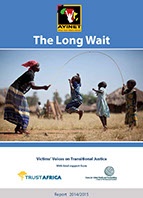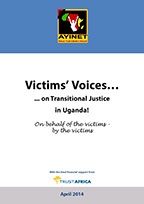National War Victims’ conference – Day 1
A brand new Uganda: National War Victims’ Conference kicks off in Kampala
For more than two decades, northern Uganda was laid waste by the Lord’s Resistance Army (LRA) rebellion. More than 30,000 children were abducted and 32,000 adults. 200,000 were killed and 2 million more displaced. The conflict came to an end in 2005 but since then, the victims have seen little to no progress in their lives. Finally, nine years later, the African Youth Initiative Network (AYINET) has brought hundreds together to take part in a dialogue with policy makers, politicians and charities to discuss what their grievances are and what they want for their futures.
The conflict in the North is only one of the many that has scarred Uganda since independence. Ugandans have suffered from border disputes with Tanzania, under the hands of the Allied Democratic Forces, due to regime changes or due to disputes between different tribes. The National War Victims’ Conference, which is starting today, 28 May 2014, in Kampala, has brought together Ugandans from all regions, representing all age groups, both genders and most if not all conflicts.
Alongside the people of Uganda, victims were joined by those from Kenya, Burundi, South Sudan and the Democratic Republic of Congo, who have also suffered and who, until now, have been voiceless.
AYINET’s director, Mr. Victor Ochen, who grew up during the war between the LRA and the Government, opened the three day Conference and welcomed the victims of war, demanding for an active voice within the National Transitional Justice Policy and a respect for all human rights.
“We have all suffered in one way or another,” he said. “Now it is time for the rights of every victim to be protected.”
He was joined by the Minister of Justice and Constitutional Affairs, who stressed that Uganda must now work together to overcome the “deep scars” of its troubled history and the importance that the victims’ “voices are heard.”
“History does not repeat itself,” he said. “It is men who do not learn from their mistakes.”
Huruna Sebi, who spoke to represent all the victims of northern Uganda and beyond, described his painful exile from Uganda during the conflict, which affected him, and called on the Government to begin the process of reparations for victims.
To close the introductions, Bishop Malusi, of Trust Africa, spoke about how Ugandans, after independence, had “hoped for freedom” but were instead “treated to the worst kind of bondage.”
During the first day, three topics were discussed – a general overview of the upcoming Transitional Justice policy, the medical and psychosocial needs of victims and the tens of thousands of people who are still missing.
Transitional Justice – our past is our future
Ms. Margaret Ajok, from the Justice, Law and Order Sector, outlined the proposed strategies for the National Transitional Justice Policy, which would see the Ugandan Government help reconcile the crimes and traumas of the various Ugandan conflicts.
The policy foresees five strands of justice – truth telling, amnesties, reparations and both formal and informal justice mechanisms.
Ms. Margaret Ajok argued that truth telling was vital for “documenting the national history” to shape the “national future” and that there had been “no agenda” to address what had happened to victims because there was no record of “human rights violations.”
Amnesties given under the 2002 Amnesty Act had benefitted 26,000 people and resulted in 5,000 people being integrated back into their communities, Margaret said. However, she said many had been forced to accept amnesties, even though they had been abducted and that amnesties focussed on perpetrators, not the needs of victims. As a result, amnesties in the future could be given conditionally, in return for processes like truth telling in the community. The final outline of the upcoming amnesty legislation is not yet clear.
She outlined how traditional justice structures are already present in many afflicted communities and how much easier they are to access than the formal justice system. Crucially, the structures can also process injustices quickly, reconcile victims with those who abducted them and bridge the gap with the courts. However, traditional justice is not regulated and can often be unaccountable. They are also dominated by men and can overlook the needs and grievances of women and children.
Margaret also outlined the need for the Government to roll out a reparations scheme as soon as possible and make sure the courts dealt with the most serious crimes effectively.
War victims’ response
There was both strong support and criticism of the different types of Transitional Justice. Many argued that the victims and communities most in need after the conflict had been neglected by post-conflict projects and reparations.
One woman questioned how fair traditional justice would be when it was ran by men and harder for women to access, another said tortured women had been ignored and stigmatised.
“How can women who are not educated, are not able to read or write, get help?” one asked. Another said women had to be empowered to speak out and that immediate concerns like the education and health of their children also needed to be addresses immediately.
One woman spoke passionately about the limitations of truth telling. “I was abducted and raped, that is the truth,” she said. “But what has been done? When my child, who I had in captivity, is hungry, what is the use of an amnesty?”
Medical and psychosocial needs of victims – we need help to get the help we need
Jackson Opio of AYINET described what physical and mental damage the conflict had wrought upon victims – from the post-traumatic stress disorders of those abducted to the men and women who had been mutilated by LRA rebels.
He told how victims had been turned away by hospitals, or told to pay extortionate fees, meaning that AYINET had to find millions in funding to provide surgery for almost 4,000 people and counselling for more than 20,000.
A victim who had his hands and nose cut off by LRA rebels explained how he struggled on his own. “It is difficult for me to talk like this in front of people but I ask for help for people like me who have nothing to feed on.”
Teddy Atim, who works for the Feinstein International Center, described how her organisation’s survey of thousands of households in Northern Uganda had highlighted how injuries sustained during war – both mental and physical – had a direct impact on poverty. During the research, it was discovered that 55 per cent of people in the war torn area had witnessed or been a victim of a serious crime – massacres, mutilations and rape.
Missing people – our society cannot move forward without finding out what happened
Jeremy Sarkin, a Professor of Law from South Africa and a member of the UN Working Group on Enforced or Involuntary Disappearances, explained how a disappeared person differed from a missing person.
For a person to be disappeared, they must have been deprived of their liberty by an agent of the State. However, it also qualified if the State turned a blind eye and has been extended to forced disappearances by political bodies outside the state.
He stressed that for Transitional Justice to succeed, victims must be able to find what happened to their relatives and friends.
“It will haunt society forever if they are not found,” he said. “Impunity cannot exist and by finding out what happened, it will deter others in the future.”
In dialogue, one victim said that the communities could never forget all the people Joseph Kony, the leader of the LRA, had abducted.
“Kony is still alive and we are always in fear that he could come back at any time,” he said. “If the Government wants to bring stability, we must find out where our people are.”
Another said that anyone who could talk of moving forward from the issue of missing people had not been a mother whose children had never returned home from school.
“They have not thought about the father who was maybe killed in the bush or was killed by the UPDF (Uganda People’s Defence Forces).”
Others said orphans were suffering because relatives were not looking after their health properly or taking them to school.
“If they do not go to school and get an education, the only thing they know will be to take a gun and go into the bush,” one said.
Finally, one victim demanded the Government help collect as much data as possible on those who are still missing from the conflicts and asked the army to be aware that when he spoke of finding Kony, it was also talking about their relatives who had been abducted by him.




